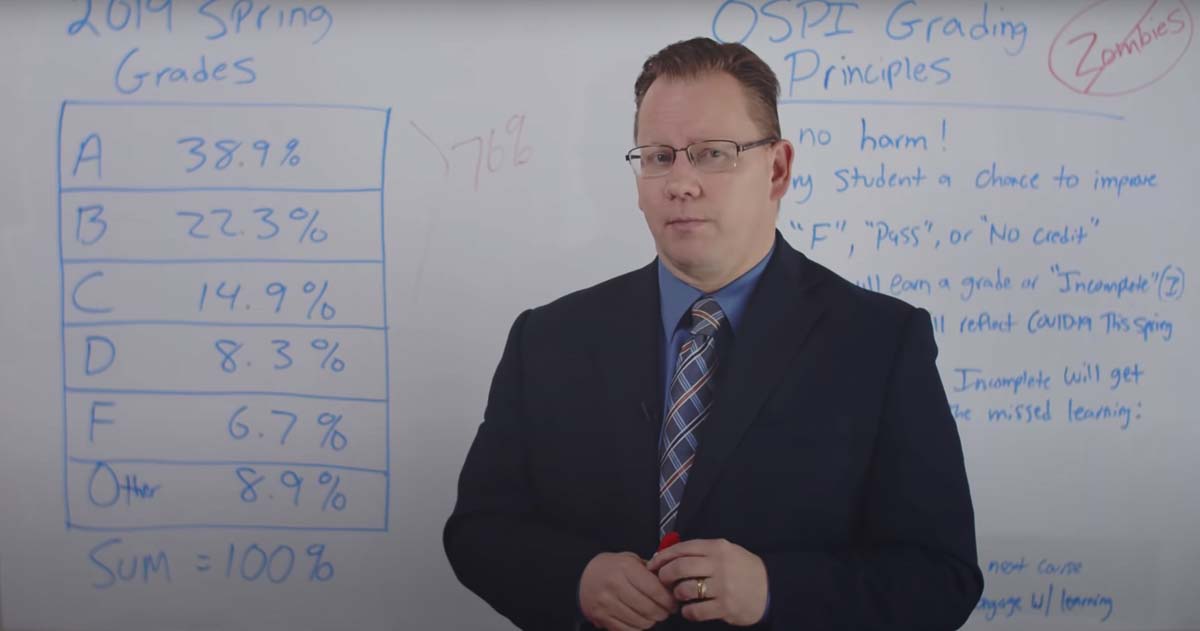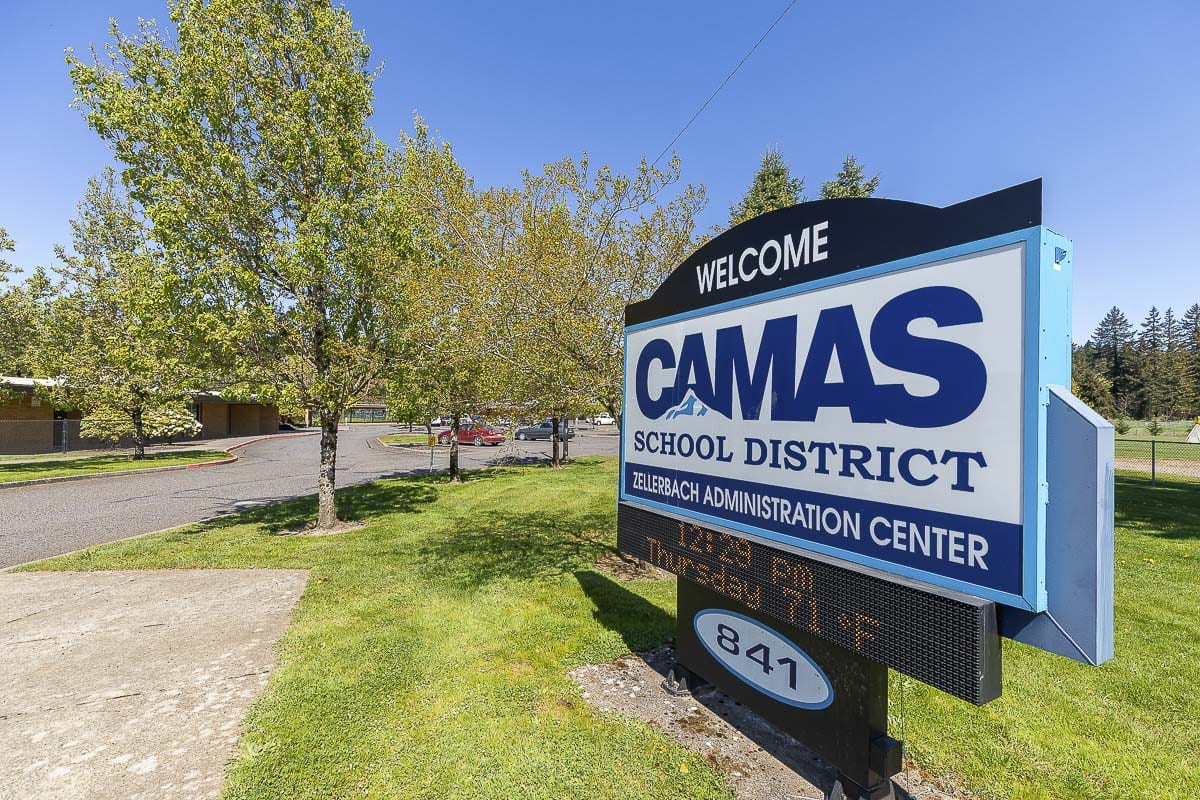Districts will mark students below a certain grade level as ‘incomplete,’ but no one is being held back this year
CLARK COUNTY — With school buildings closed for the remainder of the academic year, and perhaps longer, districts across Washington state have been left to figure out how to address the educational needs of students, and also how graduations should be handled.

Earlier this month, State Schools Superintendent Chris Reykdal convened a stakeholder group to provide feedback into the issue.
The feedback ranged from giving all students an “A,” to eliminating letter grades and going with either a “pass” or an “incomplete” rating.
In a video outlining his decision, Reykdal said the concern over those approaches were that students who might need more help in some areas could get lumped in with those who have done well.
Still, he says, the state had to approach the situation realizing that no student deserves to be punished because of a pandemic that they had no control over.
“First and foremost, do no harm,” he says. “Every student should have the opportunity to take a deep breath right now and know that they’re not moving backwards in their grades, every student will have a chance to improve.”
For high school students, grades will be frozen where they were on March 17, when the decision was made to close schools due to the COVID-19 outbreak.
“There was so much concern about a pass/fail or a pass/no credit system,” Reykdal says, “that you’d essentially be trying to decide whether the student who really struggled with a concept should get the exact same mark as somebody who’s really accelerating.”
Under the guidelines from the Office of Superintendent of Public Instruction (OSPI), teachers will assign students a letter grade based on where they were March 17. Those who require more help to avoid receiving an “incomplete” will be given the chance to work with educators the rest of this school year, or have classes during the Summer.
“It’s not a fail, it doesn’t hurt the GPA, it’s not a withdraw, it’s not a no credit,” Reykdal says. “It’s a sort of pause. ‘Hey, we didn’t have enough time or weren’t able to engage in the learning the way we want.’”

For high school students, especially seniors, transcripts will include a notation about the circumstances surrounding this year’s graduating class.
“We want anyone evaluating their transcript in the future to know the moment that we were in,” says Reykdal.
That notation was also requested by businesses, as well as colleges and universities, who wanted to make sure there was a “historic record of this moment.”
“I think that helps to ease everyone’s anxiety a little bit around grades at this time,” Reykdal added.
Under a State Board of Public Education decision from last year, districts also have the authority to issue waivers for some credit requirements in order to help students graduate on time.
At Monday’s Battle Ground School Board meeting, held remotely, Assistant Superintendent Denny Waters explained that the waiver has limitations.
“We understand that we still can’t go below the 20 credits that are required,” Waters told the board. “That’s the lowest you can go. So really, in a sense, you can only eliminate three of those credits.”
Waters says the district looks at the credit waivers as a “last choice option,” but they will first be looking to work individually with students in need of help to try and get them up to the level needed to graduate.
“And if we can’t, and there are some extenuating circumstances and reasons behind that, we’ll go back and we’ll take a look at those waivers,” Waters added.
While passing grades are now set in stone, and those with failing grades will have a chance to improve, districts and the state superintendent are urging students to take advantage of learning opportunities no matter where they currently are.
“For underclassmen, we’re really focused on the idea that while you may be happy with your C, or your B-minus, or whatever that may be, still understand that when next year comes around, you’re going to have to go into that next class,” said Waters. “And some of those skills that you need to be successful in that next class require you to continue to practice, and continue to work, and continue to learn.”
Reykdal has also used the current crisis to enforce emerging ideas that grades are less important than a student’s ability to demonstrate that they can learn.
“It’s not the A, or the B, or the C that makes you an amazing person as you take your next step,” Reykdal said in his video. “It’s the fact that you understand quantitative reasoning. That you can write, that you can communicate, that you can think about systems in a scientific world, that you can engage history and know its context today. It’s the PE, the health and the fitness.”
In his guidance to schools, Reykdal stressed that the continuous learning now happening online to be more narrow in focus.
“Continuous learning requires educators to think about the enduring concepts of content; learning being for learning’s sake, without the expectation of covering a specific content or subject area,” the guidelines read. “Students are introduced to concepts and explore content while applying their learning and self-assessing in a way that demonstrates learning and progression in grade level standards as established by Washington State Learning Standards.”
Districts responded early after the closure, distributing Chromebooks or iPads to thousands of students, or offering printed lessons for those who lack reliable internet access. Teachers have helped to film lessons that students can access online, and then arrange for video conferencing if more help is needed.

Still, hundreds of students still haven’t taken advantage of the remote learning opportunities, and there is concern they may not do so now, knowing that failure is not an option.
Waters says Battle Ground teachers have been repeatedly reaching out to parents of students who have yet to log on, urging them to make sure they are taking advantage of the opportunities to continue improving.
“Once we find out that a student is not engaging, we are reaching out personally to those families, in many instances, you know, 3, 4, 5, 6, 7 times to say, ‘hey, what can we do to get you back in the loop here?’” Waters told the board. “‘What can we do to help you pass these classes? We want to see you earn credits. We want to see you graduate.’”
For the most part, he says, the response has been positive.
“There may be some students that we don’t get back,” acknowledges Battle Ground Superintendent Mark Ross. “But we’re working really hard … to try to get them back and keep them on track.”
Reykdal says some of that involves helping parents and students understand that the rest of this school year is more about evaluating the ability to learn than it is trying to keep up with what is being lost during the shutdown.
“Let’s take this as a moment, to have a deep breath together to focus on standards very specifically,” he said to educators. “To evaluate students’ success right now and their ability to be successful at the next level.”
The final seven weeks of the school year, Reykdal says, will largely be used to evaluate the system, help students who need or want to improve, and try to figure out if the next school year will start the same way.
To find out how your student’s school district is addressing grading, click the link below.




